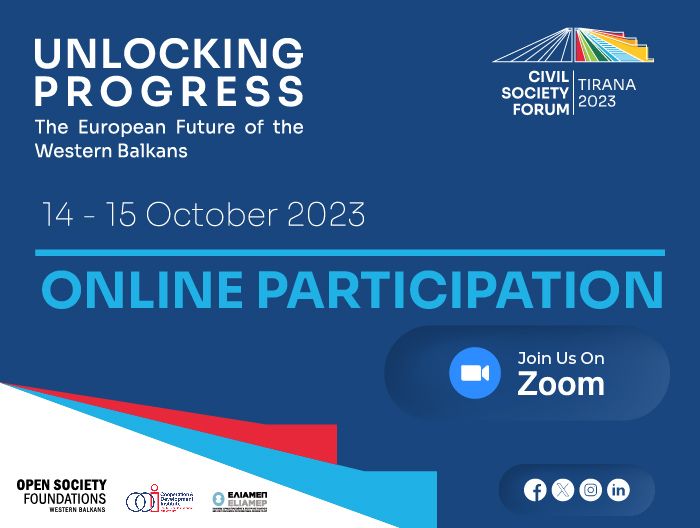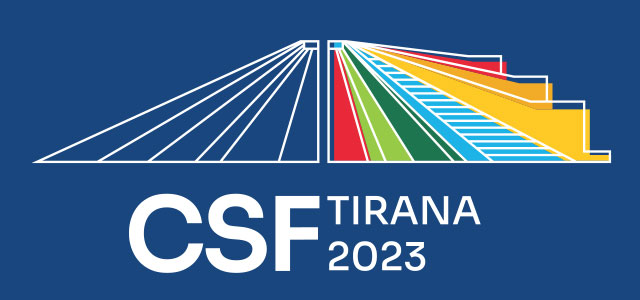| Rezar Balla

Civil Society Forum – Tirana 2023 | “Unlocking Progress: The European Future of the Western Balkans”.
The Civil Society & Think Tank Forum 2023 (#CSFTirana2023) is scheduled to take place on the 14th and 15th of October in Tirana. This forum is being organized by the Open Society Foundation – Western Balkans, acting under the mandate of the Government of Albania, which currently holds the Presidency of the Berlin Process. The event is a collaborative effort between OSF-WB, the Hellenic Foundation for European & Foreign Policy, and the Cooperation and Development Institute.
The forum is structured around seven thematic working groups, each led by civil society organizations from the Western Balkans region. These working groups have initiated discussions on crucial topics, which encompass energy, access to the European single market, digitalization and connectivity, climate and the green agenda, mobility and migration, security and geopolitics, and the politics of enlargement. These groups have actively engaged in a comprehensive consultation process, involving civil society and regional experts, to collaboratively formulate policy recommendations.
This forum promises to be a crucial platform for constructive dialogue and collaboration aimed at advancing the interests of the Western Balkans and fostering positive developments in the region.
The format of #CSFTirana2023 is both in person and hybrid. If you can’t reach Tirana to be part of #CSFTirana2023 you can JOIN ONLINE. Below you can find all the information for each session of #CSFTirana2023 and register to learn more about.
See you online!
Launching Event of Civil Society Forum Tirana 2023 at the Pyramid of Tirana
REGISTER IN ZOOM
Unlocking Progress: The European Future of Western Balkans
Rule of law is a non-negotiable principle for EU accession and Western Balkan leaders must deliver on their commitments and show tangible progress in reforms. The renewed enthusiasm for enlargement and the reinvigorating debate in speeding it up require the support, commitment, and engagement of all actors – government, businesses, and civil society. As the introduction of EU’s new financial instruments is discussed, political and technical challenges such as corruption, organized crime, and weak institutions need to be tackled head-on. This panel will address the link between economic prosperity, democratic transformation, and the perspective of EU membership for the Western Balkans.
REGISTER IN ZOOM
The Politics of Enlargement: How to Seize the New Momentum?
If there can ever be a silver lining in a war, the Russian aggression against Ukraine led to the acknowledgment that European unification through enlargement should continue without delay. The reality of a war on the European continent contributed to reinvigorating the debate on how to proceed further, and how to prepare both the EU to accept new members and the (potential) candidate countries to meet the membership requirements. Opportunities for blockages in the accession process are all too numerous, political commitment is not a given and the momentum can easily be lost. Against such a backdrop, it is important to examine the contentious aspects to anticipate and facilitate solutions. What is the way forward to streamline decision-making in the Council so that candidate countries can easily navigate from one step to the next? Can Member States be convinced to refrain from vetoes on bilateral issues unrelated to the accession process? How to ensure that candidate countries deliver on the key reforms, and avoid backsliding, especially around the Fundamentals?
REGISTER IN ZOOM
Breaking Barriers to Regional Security Cooperation: How to Address Trust Issues Among Security Institutions in the Western Balkans?
The brutal invasion of Ukraine by Russia has dramatically shifted geopolitical dynamics and energized efforts to bring the region closer to the EU. Effective security cooperation among the Western Balkan countries is central to European integration and countering transnational threats to the region and the wider EU. The panel will discuss strategies for rationalizing regional security cooperation initiatives and building greater confidence for exchange and collaboration among security institutions in the region. It will also assess how the current state of regional security cooperation impacts potentially malign foreign influence, cybersecurity, organized corruption, corrosive capital, and more.
REGISTER IN ZOOM
Full Access to the EU Single Market as a Pathway to Prosperity: Can the Western Balkans Achieve Seamless Integration?
The Growth Plan for the Western Balkans plan is an opportunity for the EU to offer a feasible strategy that would allow facilitated access for the countries from the region to the Single Market. Swiftly adopted trade derogations and market integration initiatives following the Russian aggression in Ukraine reflect the EU's capacity for strategic response in an evolving geopolitical context. Nevertheless, full access of the Western Balkan to European markets ahead of membership is a challenging task. This panel will discuss which political and legal decisions need to be made to advance economic integration, as well as the need to improve capacities and put forward an economic rationale that gives credibility to the EU enlargement process.
REGISTER IN ZOOM
Greening the Western Balkans: Uniting for Sustainable Infrastructure, Biodiversity Protection, and Effective Governance
Meeting the EU requirements for environment and climate as well as fulfilling the Green Agenda obligations places a significant financial burden on the Western Balkan countries. On the other hand, the Green Agenda is a fundamental pillar in the EU’s engagement with the Western Balkan countries, especially as it navigates the complex process of EU integration. This panel will address critical issues related to green infrastructural investments, environmental conservation, and governance in the Western Balkans region. It brings together experts, policymakers, and stakeholders to discuss holistic strategies aimed at fostering a more sustainable and environmentally responsible future in the Western Balkans.
REGISTER IN ZOOM
A Process That Delivers: Enhancing the Berlin Process Through Accountability Mechanisms
In times when global challenges demand collaborative solutions, the Berlin Process has emerged as a vital platform for fostering cooperation and driving positive change in the Western Balkans. The panel will examine possible accountability mechanisms that can play a pivotal role in elevating the effectiveness and impact of the Berlin Process. Bringing together parliamentarians, experts, and media representatives, this session will explore the various facets of accountability within the Berlin Process, shedding light on the mechanisms, strategies, and best practices that can ensure tangible outcomes and progress. Participants will gain valuable insights into how accountability can reinforce commitments, enhance transparency, and bolster the overall success of the Berlin Process in areas such as regional stability, economic development, and political cooperation.
REGISTER IN ZOOM
Freedom? The European Destiny of the Western Balkans
Conversation with Lea Ypi, Professor in Political Theory, London School of Economics, Led by Igor Štiks, Professor, Faculty of Media and Communications, Singidunum University.
REGISTER IN ZOOM
Challenging ‘the Lack of Administrative Capacities’ Narrative: How Can Western Balkans Absorb More EU Funding?
The Western Balkans’ access to the EU budget has remained limited and highly disproportionate to its level of market integration, with allocations remaining largely unchanged over the last three budgetary cycles. Both Western Balkan and EU actors have been advocating for increased funding for the region in support of economic convergence and meeting the EU accession criteria. However, this shift requires fitting in the larger sums for the candidate countries among the already mounting needs in the Union budget. Moreover, the Western Balkan countries would have to be ready to deliver mature projects and ensure their implementation, whilst respecting rule of law conditionality. This panel will reflect on the lessons learned from previous enlargement that could provide insights on how to address the bottlenecks in terms of absorption capacities and streamlining EU funding to meet the requirements of membership.
REGISTER IN ZOOM
Towards a Just and Inclusive Energy Transition: Accountability and Oversight of the Western Balkans Energy Sector?
The years leading to 2030 will be crucial for the decarbonization and energy transition of the Western Balkans. Ambitious and robust policies and measures are needed in the energy and climate sector to enable the region’s economies to cope with EU climate neutrality goals, abandon fossil fuels, and make a resolute choice in favor of low-carbon energy sources. Energy transition needs to be just, inclusive, and accountable, with the EU and national parliaments playing a notable role in decision-making processes, particularly in the upcoming extension of the Energy Community Treaty. This panel will discuss the implications of the integration of the Western Balkans economies into the EU emission trading system, particularly in terms of decarbonization policies and regulatory frameworks. A further topic of discussion will be how the Berlin Process could provide a framework for inclusive energy transition by emphasizing the stakeholders’ cooperation as driving force of transition.
REGISTER IN ZOOM
Reaching Over the Digital Fence: How Can EU Regulation Help Improve Digital Markets and Services in the Western Balkans?
Countries in the Western Balkan region face regulatory challenges in tackling illegal and harmful content online, are unable to protect citizens’ rights as users and consumers, and lack functional mechanisms to ensure digital platform's accountability. This has created vast grey areas in the regional digital market that negatively affect media credibility and information integrity, jeopardize democratic processes, exacerbate foreign influence operations, and create risks for consumer safety and citizens’ rights online. The panel will discuss how we can bring the region into the EU digital single market, improve digital connectivity and online safety, and introduce accountability of Very Large Online Platforms.
REGISTER IN ZOOM
The Prospects of Mobility-Driven Research and Innovation: How to Strengthen Western Balkans Integration into the European Research Area?
Research and innovation (R&I) and knowledge transfer in the Western Balkans have the transformative potential of accelerating sustainable growth and convergence of our economies with the EU. This potential can be attained only if the pressing challenges of R&I and mobility-driven innovation in the Western Balkans are addressed timely, to catalyze regional cooperation and facilitate integration into the EU, including the European Research Area. This panel will reflect on how to strengthen the integration of the region into the European Research Area, ensuring the Western Balkan countries not only align with but also actively collaborate with their European peers in pioneering progressive initiatives.
REGISTER IN ZOOM
Closing Forum: Unlocking Progress: What’s Next?
The closing panel offers a platform for taking stock, reflecting, consolidating insights and ideas, and setting a course for future actions and potential collaborations. Speakers will provide a summary of thematic discussions and convey key messages, highlighting the importance of continued dialogue and collaboration between civil society, think tanks, governments, and the EU in the region to advance the goals of the Berlin Process, including translating the recommendations into concrete actions. This panel will offer an opportunity to reflect on how the Berlin Process has evolved through the years, its contribution to growth, regional cooperation, and enlargement, and what adjustments can be made for the Berlin Process to be fit to respond to the contemporary needs of the region, all while assuring meaningful civil society participation.
REGISTER IN ZOOM
